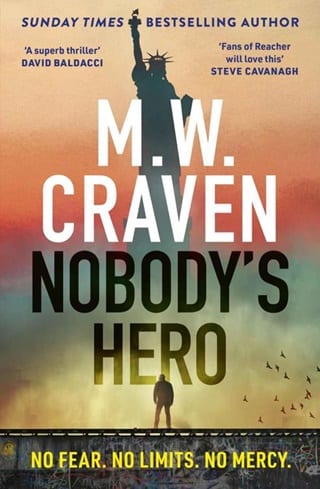Chapter 107
Koenig frowned. ‘I'm more of a chocolate-milkshake guy,' he said. ‘But . . . if the choice was between making a fruit salad or watching Police Academy 4: Citizens on Patrol , I suppose I could peel some grapes.' He paused half a heartbeat. ‘But the fruit salad is rhetorical. What you're really asking is if I understand how supply chains work.'
‘I am,' Carlyle said. ‘Take New York. The magnitude and scope of the infrastructure that keeps a city like New York running is beyond most people's comprehension. Interdependent systems like sewerage, power, telecoms, water, road, rail, marine traffic, are piled on top of each other like a giant bowl of spaghetti. But here's the thing – it's efficient, integrated and synchronised. Finely tuned chaos theory, it's been called. Unpredictable behaviour governed by deterministic laws. Getting the ingredients for a fruit salad to the New York delis, markets and grocery stores is nothing short of a miracle, yet it happens every single day.'
‘I guess I've never really thought about it,' Koenig admitted.
‘We did,' Carlyle said. ‘We thought about it a lot. Nine million people live in New York. Then we thought about what might happen if there were mass migration events in Philly, Baltimore and DC.'
‘Nine million becomes nineteen million.'
‘And now New York's infrastructure is stretched beyond breaking point. It's overloaded with little to no warning. The city's reserves are quickly used up. People are panic buying. The just-in-time supply chain becomes the three-weeks-too-late supply chain. Now what happens?'
‘There's a period of readjustment. It's not pleasant, but with outside help New York begins to cope. The city manages sixty million tourists a year, so it has the capacity to expand when it needs to.'
‘Exactly,' she said. ‘A mass migration event on its own might not achieve the effect we wanted. The country would be lopsided, like a badly loaded washing machine, but it wouldn't last for ever.'
She stopped talking. Let Koenig finish.
‘That's where Hobbs and Nash came in,' he said. ‘You don't let your enemy regroup when they're vulnerable. You stomp on their throats. Hobbs and Nash weren't involved in the mass migration event; their role was about amplifying the after effects. They killed the type of people who'd be essential in the event you describe. The damage-limitation guys, the ones with institutional memory.'
‘We identified the people that cities and states would need when it came to mounting effective crisis management,' Carlyle confirmed. ‘The ones who could steady the ship before it passed the event horizon. The protocol dictated they were killed in the lead-up to the trigger event. Quietly, nothing that would arouse suspicion.'
There was also something Carlyle wasn't telling him. Koenig thought their deaths had served a dual purpose. Their expertise in crisis management wasn't the primary reason; it was the secondary reason. He didn't know whether to be impressed or appalled. He kept his face neutral. Carlyle was a good woman, and she did what she thought best. Who was he to second guess her actions?
‘The Acacia Avenue Protocol was a three-stage attack on the infrastructure of the United States,' Carlyle continued. ‘Step one was removing the people who could limit the damage after a mass migration event.'
‘Which Hobbs and Nash have now done. Their contract was complete.'
‘Step two was triggering the mass migration event.'
‘Which, as unlikely as it seems, Tas seems to think he can do,' Koenig said.
‘And step three was a coordinated attack on key infrastructure. Nothing massive, and most of it will look like it was due to an overload on the system. A tunnel fire cuts off a critical supply route. A train derails. A ship sinks in a deepwater port. A cyberattack shuts down the city's waste management system. The protocol designed a whack-a-mole attack. One incident after another. Relentless. Too many to contain. Eventually the whole system would collapse. We calculated we would go from "everything is normal" to a National Guard-enforced curfew within three weeks.'
‘That quickly?'
‘That's a conservative estimate,' she said.
‘It wouldn't take that much seed money,' Koenig said. ‘Mycotoxins already exist in weaponised form. Assholes like Tas and Hobbs need paying, but otherwise there'd be no other significant costs.'
‘We calculated one hundred million dollars,' Carlyle said. ‘And there are almost one thousand billionaires in the US alone. They could fund it with the money they keep under their mattress.'
Mattress.
Carlyle's analogy shone a light on what Nash had overheard Konstantin say. Helped Koenig see it properly. Waterbed. A waterbed was a mattress. It hadn't made sense. Except now it did. Now he had the missing context. Konstantin hadn't said ‘waterbed'. He was Russian. Russians didn't talk like that. Konstantin had said something different. Something lost in translation.
‘Konstantin didn't say "waterbed",' Koenig said. ‘I trained with the Russian SObr, their special forces police unit, and I know how they speak English. The open and long "?" doesn't exist in the Russian language. The vowels A and E end up being pronounced the same way – as an "eh" sound. So "fad" becomes "fed"—'
Carlyle swallowed hard. ‘And "bad" becomes "bed" . . .'
‘Exactly. Nash didn't overhear Konstantin say "water bed ", she overheard him say "water bad ".'
He took a moment. Let it sink in.
‘Tas isn't using mycotoxins,' Koenig said. ‘He's found a way to poison the water.'
 Fullepub
Fullepub 



